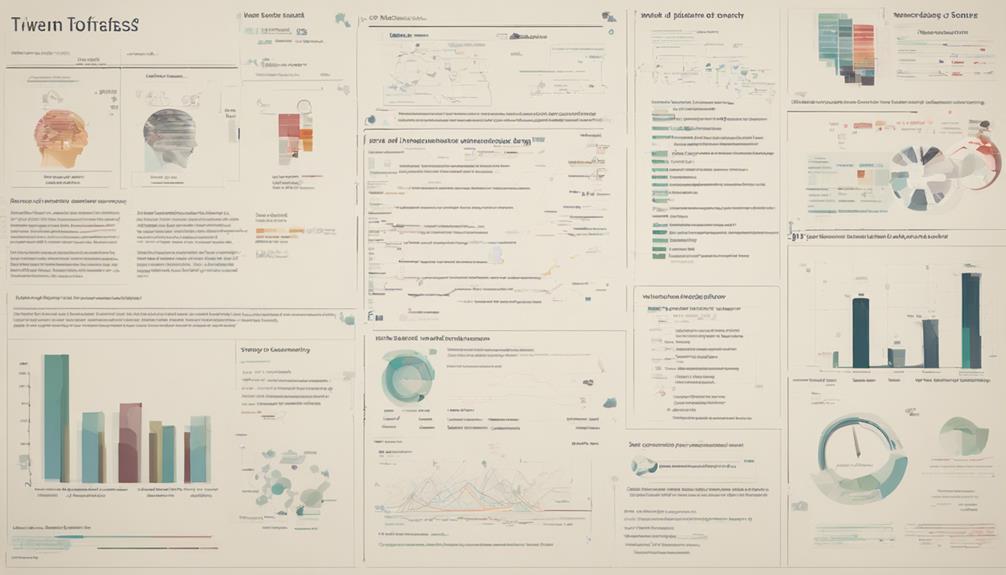Experiencing a divorce after three decades with a narcissist can be daunting, especially with the deep connections formed during that time. However, understanding the complexities that may arise in these situations is crucial for safeguarding your well-being and future.
As we delve into the intricacies of untangling a long-term relationship with a narcissistic partner, we uncover strategies that can empower individuals to reclaim their autonomy and rebuild their lives.
Key Takeaways
- Recognize narcissistic traits in a long-term relationship to protect emotional well-being.
- Seek professional guidance and support from specialized professionals familiar with narcissistic cases.
- Document interactions and evidence meticulously for divorce proceedings.
- Establish clear boundaries post-divorce and prioritize personal well-being.
Recognizing Narcissistic Traits After 30 Years
After 30 years of marriage, we’ve become experts in recognizing the insidious traits of narcissism that have long been present but perhaps unnoticed. The journey of understanding narcissistic traits has been a challenging one, especially when dealing with emotional and mental manipulation.
It’s crucial to document everything, from conversations to actions, as these individuals often distort reality to suit their needs. The lingering emotional impact of being in a relationship with a narcissist can be profound, leading to self-doubt and confusion.
Recognizing the signs of narcissistic behavior is the first step towards reclaiming our sense of self. From their manipulative tactics to their lack of empathy for others, understanding these traits empowers us to set boundaries and protect our emotional well-being.
Seeking Professional Guidance During Divorce

Having navigated the intricate web of recognizing narcissistic traits after 30 years, we now understand the vital importance of seeking professional guidance during divorce proceedings.
Divorcing a narcissist after three decades involves complexities beyond comprehension, from emotional abuse to legal battles. Here’s a strategic approach to seeking professional guidance in such a challenging situation:
- Find a Family Law Attorney: Look for an experienced attorney well-versed in handling high-conflict divorces, especially those involving narcissistic individuals.
- Therapy or Counseling: Consider seeking emotional support to navigate the manipulation and control tactics that may arise during the divorce process.
- Consult a Financial Advisor: Protect your assets and secure your financial future by consulting a financial expert familiar with divorce cases.
- Specialized Professionals: Seek out professionals who specialize in cases involving narcissistic personalities to ensure you have the right support.
- Crucial Guidance: Professional guidance is essential for safeguarding your emotional and mental health while dealing with the intricate web of divorcing a narcissist.
Documenting Evidence for Divorce Proceedings
To build a strong case during divorce proceedings with a narcissist, meticulous documentation of all interactions and relevant evidence is crucial. Keeping detailed records of financial transactions, abusive behaviors, and any form of communication is essential. This documentation can help protect your rights and support your claims throughout the divorce process. In addition to saving emails, text messages, and voicemails, maintaining financial statements and records of assets will be beneficial. It’s vital to document incidents of emotional or verbal abuse as well, as these can have a significant impact on the proceedings.
| Documentation Type | Importance | Actions to Take |
|---|---|---|
| Financial Transactions | Protect your rights | Save receipts and bank statements |
| Communication Records | Support your claims | Archive emails, texts, and voicemails |
| Abuse Incidents | Validate emotional impact | Record details and dates of incidents |
| Asset Records | Ensure fair division | Keep track of all shared assets |
Consulting with a divorce attorney and seeking emotional support within your support network can provide guidance on navigating the emotional and psychological aspects of the process. Achieving financial independence and having a strong support system are crucial elements in successfully divorcing a narcissist after a long marriage.
Establishing Clear Boundaries Post-Divorce

Navigating life post-divorce with a narcissist of thirty years calls for setting clear boundaries to safeguard emotional well-being and ensure a smooth transition to a new chapter. Establishing boundaries is crucial in protecting yourself during this challenging time.
Here are some key strategies to help you maintain your boundaries effectively:
- Limit Communication: Utilize written forms like email or text to minimize emotional conflicts.
- Assertive Boundaries: Don’t allow yourself to be intimidated; firmly establish and maintain your boundaries.
- Avoid Power Struggles: Refrain from trying to change the narcissistic behavior; focus on your own well-being instead.
- Legal Support: Seek assistance from an attorney if needed to enforce boundaries and protect your rights.
- Prioritize Yourself: Concentrate on rebuilding your life after the divorce, prioritizing your emotional and mental health.
Prioritizing Well-Being Amidst Legal Battles
In the midst of legal battles with a narcissistic ex-spouse, prioritizing your well-being is paramount for navigating the complexities of the divorce process. When divorcing a narcissistic spouse after 30+ years, it’s crucial to seek professional guidance from an attorney well-versed in high-conflict divorces and narcissistic personalities. Finding a legal expert who understands the intricacies of such cases can provide the necessary support and strategic advice to protect your interests.
Documenting everything, from financial transactions to instances of abuse, is essential for building a strong case. This evidence can be pivotal in court proceedings and safeguard your rights during the divorce process. Setting clear boundaries with your ex-spouse and opting for written communication can help mitigate potential conflicts and maintain a sense of control.
While navigating the legal aspects of the divorce, remember to prioritize your emotional well-being. Engage in self-care practices, seek support from loved ones, and consider therapy to cope with the challenges ahead. Stay committed to the process, uphold your needs, and resist succumbing to the demands of the narcissistic ex-spouse.
Frequently Asked Questions
What Do Narcissists Do During Divorce?
During divorce, narcissists often manipulate, gaslight, and abuse. They may attempt financial control and deceive. Legal battles with reputation attacks are common.
It’s vital to set strong boundaries, document everything, and safeguard yourself and your children. Seek professional support, prioritize healing, and self-care.
How Do You Outsmart a Narcissist in a Divorce?
To outsmart a narcissist in a divorce, we stay one step ahead by documenting everything, communicating in writing, and keeping our cool to deflect their manipulation.
By using the Gray Rock Method, we neutralize their tactics and protect ourselves.
Anticipating their moves and safeguarding our well-being and that of our children is key.
Staying strategic and composed helps us navigate high-conflict situations and come out stronger on the other side.
Will a Narcissist Ever Settle Divorce?
We’ve dealt with divorcing a narcissist before, and we understand the challenges of settling a divorce with one. Narcissists often struggle to settle easily due to their need for control. Expect prolonged legal battles, delays, and manipulation tactics.
It’s crucial to document everything meticulously and gather evidence to protect yourself. Seek guidance from professionals experienced in narcissistic abuse and rely on a strong support system of friends and family for emotional strength.
How Do I Leave a Narcissist After 30 Years?
Leaving a narcissist after 30 years requires careful planning and support. We suggest seeking guidance from a family law attorney skilled in high-conflict divorces.
Document all interactions, finances, and abusive behaviors for legal purposes. Establish clear boundaries and opt for written communication to avoid emotional turmoil.
Prioritize self-care and lean on compassionate friends and family for emotional support. Remember, you deserve to live a life free from manipulation and abuse.
Conclusion
As we navigate the treacherous waters of divorcing a narcissist after 30 years, remember: we’re warriors, not victims.
Let’s arm ourselves with the tools of self-care, boundaries, and support.
We may feel like we’re climbing Mount Everest blindfolded, but we’ll reach the summit stronger and wiser.
Keep fighting for your peace and freedom, because you deserve it more than anyone.
Stay strong, stay focused, and never give up.










